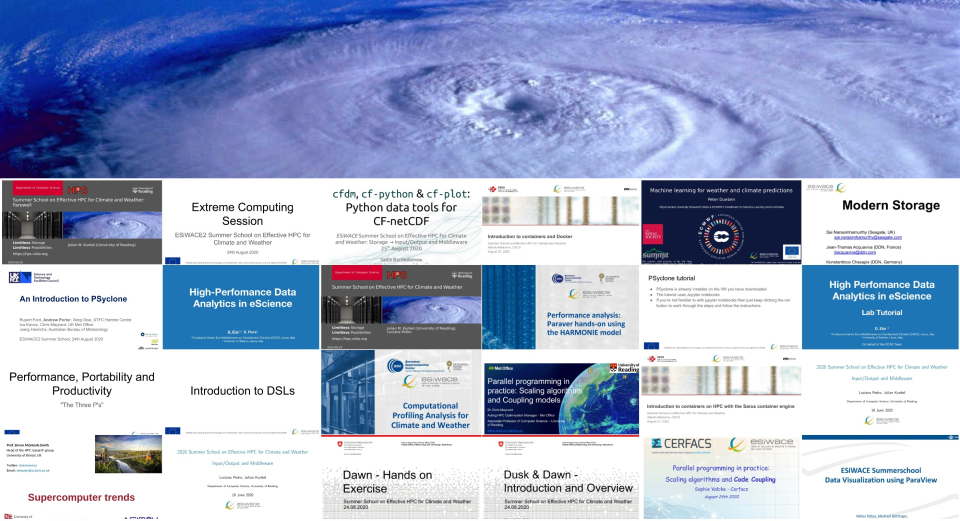https://www.photojoiner.net/v/BTvmSc6R
The virtual summer school provided five days of learning and debating HPC systems and climate and weather applications.
We received 162 applications, and 54 participants who attended more than 70% of the event were granted a certificate of participation. The countries with the most participants were: UK (19.8%), India (12.3%), and Germany (11.1%). In total, we had 38 countries represented in the event. All applicants were added to a mailing list to facilitate communication between them and the organisers, and to inform the participants about related events afterwards.
The format of the summer school was slightly changed to accommodate the current situation in the world. From Monday to Thursday, a topical session consisting of an academic lecture and hands-on/lab practicals was delivered. This made in total 18 hours of lecture and 10 hours of hands-on training. There was also a virtual visit to ECMWF, covering tours to the Computer Hall and to the Weather Room. The sessions covered the following topics:
-
Monday: Extreme-Scale Computation (STFC, MeteoSwiss) and Parallel Programming in Practice (CERFACS, UREAD).
-
Tuesday: Modern Storage (Seagate, DDN) and Input/Output and Middleware (UREAD).
-
Wednesday: Machine Learning (ECMWF) and High-Performance Data Analytics and Visualisation (CMCC, DKRZ).
-
Thursday: Performance Analysis (BSC) and Containers (ETH Zürich, NCAS).
On Friday, a different format was administered. We organised extra sessions in a Q&A format for each lab that happened during the week, and we finished the programme with a keynote talk. Daniel Klocke of the German Meteorological Service (DWD) presented his work on global storm- and ocean eddy-resolving coupled climate simulations and the contributions of projects DYAMOND and DYAMOND2.
All sessions were recorded and the recordings, together with the presentations and material for each session, are available on the main summer school web page.
After the event, we asked the participants to fill out a survey. Here are some of the main numbers and comments about the summer school:
-
38.5% said that the summer school was better than they had expected, and 46.2% said that it was as good as they had expected;
-
92.3% said that they had an excellent or good experience;
-
Selected quotes from attendees about what they most liked:
-
"The combination of learning the theory, getting some hands-on it, and working with the learned things";
-
"The interdisciplinary spirit of the presentations and profound knowledge of people invited to talk";
-
"High-quality presentations and I can revisit it when I need on YouTube".
We are now compiling all the information for deliverable D6.1, "Report on summer school and its material". This report will cover the teaching material and will discuss the results of the conducted survey regarding the quality and effectiveness of the summer school and the individual OER materials.
Julian Kunkel & Luciana Pedro

